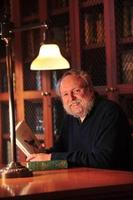 |
| Michael Ruse |
Why were the great Greek philosophers (including Plato and Aristotle) firmly set against the idea of natural origins? Why were they so adamant that natural origins were impossible? According to Michael Ruse, a philosopher of biology at Florida State University, the reason is the problem of "final causes."
Aristotle, for example, "could not see how something like this could come about through blind law," said Ruse in a lecture given at Arizona State University’s Origins Project Science and Culture Festival on April 7, 2011.
This is why, for good scientific reason, said Ruse, they turned their back and rejected the idea of natural origins.
What was the big move? Robert Boyle particularly put his finger on it, said Ruse, we’ve changed the thinking of the world as an organism, to the world as a clock. This was a new metaphor for the world—the world is at some level a machine.
Going into the 18th century, the ideology of progress began to emerge—people began to thinking about social progress in biological terms. This is how the notion of evolution became set into the culture.
In the time of Erasmus Darwin, Charles's father, he became an evolutionist (what he called "transmutation") and was a strong promoter of social progress. He wrote that progress evolution, "is analogous to the improving excellence observable in every part of the creation… such as the progressive increase of the wisdom and happiness of its inhabitants."
Concurrently, others of the same time period loathed the ideology of evolution and social progress. Religion may have been part of it. What they really loathed is the idea of progressiveness, the change it brings.
Charles Darwin changed things dramatically, Ruse said. He established the fact of evolution. He made evolution a science. In his Origins of Species, he doesn’t talk about humans very much, but everybody knew this was the big issue.
"He wants to get the basic theory on the table," Ruse said, yet Darwin knew very well what it implied for humankind. There was no question that Darwin believed that humans emerged by the same natural mechanism as other species.
What about the issue of progress? This is more interesting, Ruse said. While Darwin downplayed human's natural origins, his followers such as Huxley put it front and center in his Man's Place in Nature. Just before the debate, the Neanderthals were discovered, and Huxley fed the idea that they were not a different species, but early humans.
At the time, the word agnostic wasn’t yet invented by Huxley, but people such as Alfred Wallace had this type of worldview. Wallace had actually lived with what the English called savages. He had become convinced that these humans weren’t using the major potential of their brains—and promoted the idea of racial differences.
In the Descent of Man, Darwin attempts to explain racial differences through sexual selection. That natural selection could explain current Victorian views that some races were superior to others. Evolution was popular, Ruse said, because it fit directly into the idea that the English were at the top and the other races were inferior.
Back at the time, evolutionists used natural history as an alternative story to religion. Moving to the present, new atheists, Ruse said, act in the same way—they build cathedrals, for example, but they call them "Museums of Natural History."
What about progress? The late Stephen Jay Gould had a few things to say about that. He said that we must throw the idea of progress out. How can we possibly think about progress in the time of global warming and George W. Bush?
Yet, the evolutionists can’t give it up. To argue this point, Ruse used Richard Dawkins as an example. Dawkins is an ardent promoter of progress, arms races, and is deeply committed to progress, Ruse said.
That pretty much sums up Ruse's talk. I think he made some valid arguments, except the one about new atheists being ardent promoters of an idea that evolution is always akin to progress. I would defend Dawkins, but I think he does that very well himself, with this quote that I took of him only two months earlier, also at an ASU Origins event, where he defined life as anything that is highly improbable, but that appears to have a specified direction:
"You have to add that 'specified direction' because with hindsight you could say any old heap of rubbish is statistically improbable in that there has never been a heap of rubbish exactly the same," Dawkins said. "What's special about life is that living things are statistically improbable in a direction, which you could have specified in advance. It's not always exactly the same, but birds are good at flying, fish are good at swimming, moles are good at digging. All living things are good at something, whereas lumps of rock aren't."
Specified direction is a deliberate choice of words. Ruse should take notice—Dawkins clearly does not use the word progress at all.
No comments:
Post a Comment